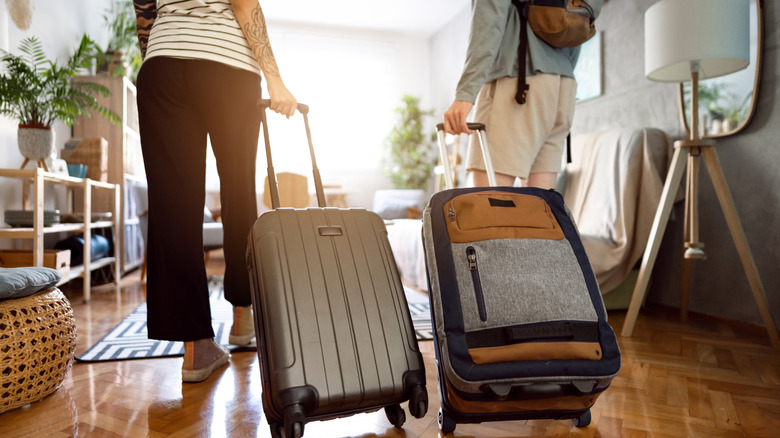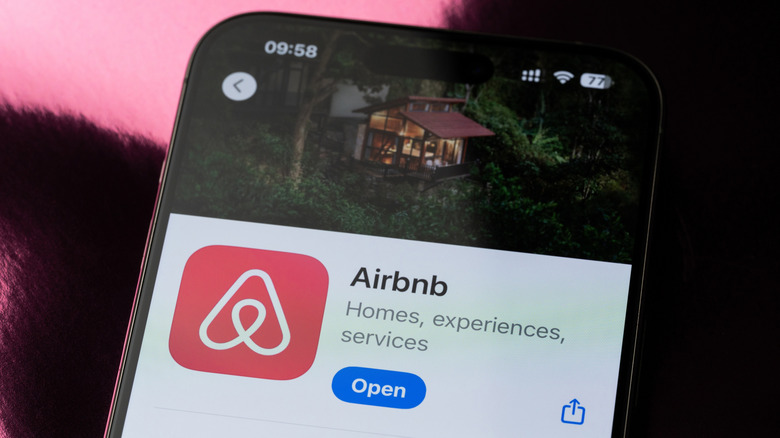The Real Reason Airbnbs Are Heavily Restricted In Some US Cities
Airbnb, the online marketplace for short- and long-term stays, has been revolutionary ever since its launch in 2008. From its origins as a start-up providing guests with a homier, cheaper, and more welcoming alternative to hotels, the platform, worth over $88 billion, has become a mammoth in the travel industry. Across 220 countries and regions, a community of 5 million hosts racked up more than 1.5 billion check-ins as of 2024. And the platform has evolved from simply offering affordable stays to boasting a wide variety of luxury and unique properties as well. You can stay in a glass pod on the side of a Peruvian mountaintop or a futuristic UFO in the Welsh countryside. Airbnb's newest feature also includes add-ons like professional chefs, wellness treatments, and photographers. So, it may surprise some travelers to find that their destination city may be wildly anti-Airbnb.
While the site has been a boon to both travelers and hosts, it has received ample backlash, particularly from locals who find themselves priced out of their own communities. Housing activists in San Francisco, for example, maintain that Airbnb has contributed to homelessness in the city by decreasing the number of affordable homes for residents. During the 2025 protests against overtourism in Barcelona, the anger against short-term renters was palpable: A woman held up a sign reading, "Your Airbnb used to be my home." The housing crisis and overcrowding have become so untenable that Spain took aim at unlicensed Airbnb rentals in its tourist-flooded cities in May of 2025.
Stateside, criticism of the platform has also reached a tipping point. In recent years, governments have sought to regulate short-term rentals through a variety of measures. In some cities, restrictions are heavy, and in others, Airbnbs are outright illegal.
What you need to know regarding Airbnb restrictions and regulations
While short-term rentals aren't illegal in any state, the rules differ wildly between them. Certain cities have banned Airbnb and similar apps, including Temecula, California. Others have put into effect zoning restrictions, licensing requirements, and other regulations. In New York City, for example, Airbnb hosts cannot rent out their homes for more than 30 days, and they must be physically present at the property. In New Orleans, both an owner and an operator permit are required to host. And in L.A., hosts cannot rent out their properties for longer than 120 days per year and must get a home-sharing permit. As a traveler, make sure that you understand what regulations are in place in the city you plan to visit, so you don't end up in an illegally operated property. Airbtics compiled a comprehensive breakdown of the Airbnb regulations in many U.S. cities.
Remember, these laws haven't been established to make your next vacation a nightmare but rather to protect the people living in residential neighborhoods and ensure that affordable housing is available for locals.
This doesn't mean that you should never use rental apps — indeed, some Airbnb locations are so remote that you'd be hard-pressed to find accommodations elsewhere. And the money generated from these stays certainly provides an income for locals and their families. However, as with any travel decision, be mindful of your actions. Perhaps it's best to avoid these stays in places that are struggling with severe housing crises. Additionally, there are some alternatives to Airbnb that you could consider, like these five vacation rental platforms recommended by travelers. Fairbnb, for example, is a sustainable, impact-focused start-up that is more selective with its hosts and donates half of its booking fees to community-based projects.

